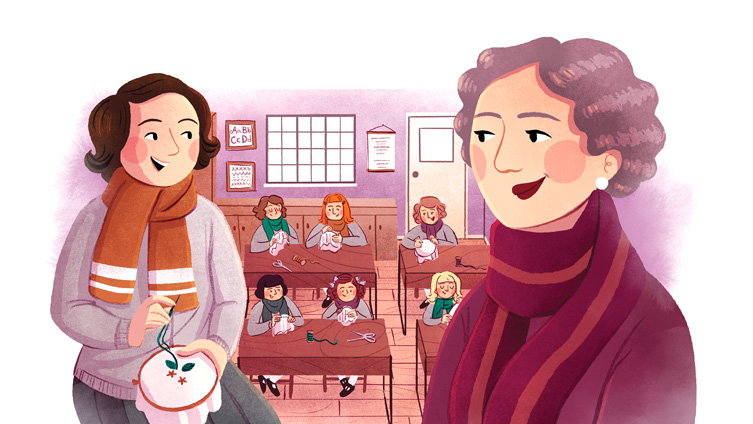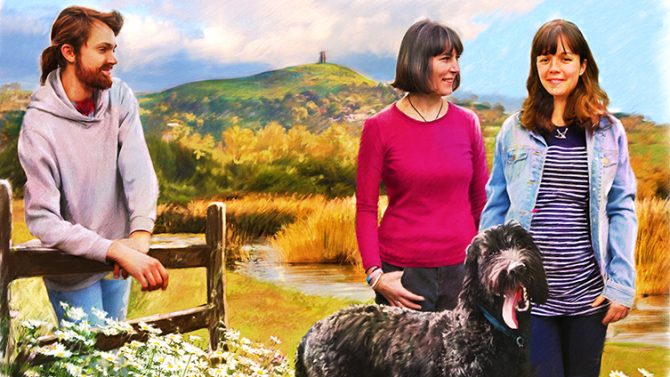A Gift For Miss Partridge
Each of these girls was special, just like all the pupils before them...

Illustration by Sarah Holiday
Subscribe to The People’s Friend! Click here
Each of these girls was special, just like all the pupils before them...

Illustration by Sarah Holiday
HISTORICAL SHORT STORY BY PENELOPE ALEXANDER
In this story, set in the 1950s, Each of these girls was special, just like all the pupils before them…
Good afternoon! We come in, Miss?” Suzie pokes her beribboned head in at the door of the hut. She’s first in line, beaming as always.
Miss Partridge finishes putting out squares of binca and sewing cottons and lets in her sewing class.
There’s pushing and shoving, and someone at the back squeals, “Watch out!”’
“Coats on pegs, girls,” Miss Partridge directs. “Collect your work from my table! Then you may sit where you like.”
They tumble in, chattering like small birds. Julia and Linda in the front row, as usual. Suzie just behind.
Miss Partridge’s newest pupil came from Hungary after the uprising last year, and despite her improving English and a confident nature, faced more than a few difficulties.
“You can sit here, Suzie,” Linda whispers.
Miss Partridge is glad to see Linda, a pleasant, sensible girl, make room for her classmate.
With the sound of shuffling and banging of seats, other girls claim places on the benches. Miss Partridge eyes them until everyone is attentive.
Each week, her group of girls scamper across from the main school, up the wooden steps and into the “temporary classroom”.
Miss Partridge supposes the hut was meant to be temporary at one time, although that must have been well before she came to teach at Roundsmead.
This is her favourite lesson, where conversation is positively encouraged. Miss Partridge gathers the girls’ collective gaze, then greets her group.
“Good afternoon, Miss!” they reply. Suzie’s voice is the loudest.
“Miss . . .” Suzie says above the general gossip as everyone lowers themselves on to their wooden seats. “Do you have favourite song?”
“Not exactly a song,” Miss Partridge replies thoughtfully, putting out pairs of blunt-ended scissors.
“But I like Winifred Atwell playing her piano. What’s your favourite, Suzie?”
The girl rubs her face, deep in thought.
“Me – I like one, two, three o’clock –”
“Four o’clock rock!” Julia finishes, grinning. She clicks her fingers. “That’s ‘Rock Around The Clock’. I like that, too.”
There’s a buzz of agreement.
Miss Partridge is wise enough to know piano music is no competition for this new rock-and-roll, now heard on every radio in the land, so she smiles and concedes Bill Haley and the Comets are popular.
There’s a lull while Miss Partridge helps Julia and Linda sort out their newly tangled threads, and the others get on with their stitching.
“It’s cold,” Linda says, wriggling down her sleeves.
“The caretaker usually sees to our stove,” Miss Partridge answers. “I’m sure he’ll be here soon.”
I’ll have to send one of the girls to find the lad if he doesn’t arrive, she thinks.
Their hut will quickly become chilly without reliable heat.
For the time being, the children and their teacher keep their cardigans buttoned and their scarves around their necks as they work.
Miss Partridge anticipates that scarves may be unwound from small necks once they’ve warmed up, so she doesn’t rush her children into taking them off.
The hut’s door rattles and opens. It’s Sid Farthing, one hand grasping a toolbox.
Just as I’ve got them settled, Miss Partridge thinks, sighing inwardly.
Even so, she’s pleased to see her former pupil, now the school’s caretaker. He wears a thick jacket and a red woolly hat.
Miss Partridge gives a brief smile of welcome, but Sid only frowns.
He strides towards the round stove in the corner.
With a swift movement, he yanks open its front, checks all is well, and shuts it again. Head down, he leaves without speaking.
Miss Partridge, remembering all the times she tried to help his communication skills as a youngster, sighs and picks up her sewing.
The children continue to work their cross-stitch.
The air warms gradually, smelling of wood, dusty coconut matting and used cotton thread.
“Better now, isn’t it, Miss? The man is kind to do that for us,” Suzie says.
“Our caretaker is called Mr Farthing, Suzie.”
“I remember that, Miss.”
“Well done.” Miss Partridge gives an encouraging smile.
“He’s sad man,” Suzie observes suddenly. “No smile.”
Miss Partridge knows this is true, but doesn’t say anything.
As a child, Sid’s mum had struggled, and so had Sid.
Once, when he was asked to remove his rubber wellingtons for country dancing, his feet were revealed to be sockless.
Miss Partridge had had to find a pair of plimsolls for him from lost property.
“Perhaps he doesn’t like his job, doing the heaters and stuff,” Julia says, pushing up her National Health glasses and glancing at Suzie.
“My mum says he needs ‘taking out of himself’.”
“Out of himself?” Suzie asks, puzzled. “What’s that, please?”
When children arrive in school without English, the most useful words aren’t “book” or “teacher” or “pencil”, Miss Partridge thinks.
Children will absorb that vocabulary naturally during everyday activities.
No, she finds words of help and politeness are far more valuable in encouraging co-operation.
Suzie says “Please” or “Thank you” and wishes everyone “Good morning” whenever she can.
Miss Partridge is delighted this sociable habit seems to oil the wheels with everyone.
She threads another needle thoughtfully. Everyone, perhaps, with the exception of Sid Farthing.
Pushing her fringe out of her eyes, Julia completes a careful cross-stitch before answering Suzie.
“I think Mr Farthing being taken out of himself really means he needs friends,” she says.
“But guess what, my mum says she’s seen him with a nice girlfriend at last.”
“Why are you smiling, Miss?” Linda asks, snipping her thread with a flourish.
“Because I’m pleased you are all being so kind and polite today,” Miss Partridge teases gently.
She has no sooner uttered these words when there’s a screech.
“A mouse, Miss!”
“I saw it, too, Miss!”
Linda leaps to her feet, while Julia, sewing waved aloft, climbs on to her seat.
“Now, girls . . .” Miss Partridge says anxiously.
She hasn’t seen anything yet, but because this hut in the far corner of the old playground that backs on to woodland, the odd mouse isn’t unknown here.
Field mice, usually. Miss Partridge hopes it’s nothing else.
“I see nothing,” Suzie whispers, carefully lifting her feet one at a time.
Miss Partridge makes a show of getting up to look, mainly to reassure her girls.
Then Suzie – who has somehow upended herself the better to peer beneath the desks – wails.
“Oh, Miss, I see! I see!”
“Sit up, Suzie!” Miss Partridge says sharply.
The little girl’s long hair has fallen free of her ribbons and is sweeping the dusty floorboards.
Her careful mother would not be pleased.
Slowly, Suzie levers herself upright, her dark hair bouncing into place about her shoulders like a shaken mop.
“I go ask Mr Farthing to get mouse!” Suzie says firmly, and she is out of the door before her teacher has any say in the matter.
Miss Partridge sends the sensible Linda after her to make sure things don’t get out of hand.
The trio return shortly, Suzie on Mr Farthing’s right and Linda (still clutching her needlework) on his left.
They stand just inside the door as if waiting for Miss Partridge to tell them what to do next.
“I’m so sorry, Sid. Mr Farthing,” Miss Partridge begins, at a sudden loss.
She’s quite certain the mouse has long disappeared beneath the floorboards, never to be seen again.
“But we do see mouse!” Suzie tells the caretaker, round-eyed. She pulls at his sleeve, her fingers scrabbling up his arm. “Like this! Running!”
Sid Farthing fixes her with a glare, while Miss Partridge clears her throat.
“I wonder if you’d be kind enough to take a look, Mr Farthing?” she asks. “Just in case.”
“Doubt I’ll find anything,” the caretaker grumbles.
“We can help?” Suzie enquires.
“No!” Mr Farthing says forcefully. “Just keep out of my way, you!”
There is a momentary silence, as if the children are listening for a kinder response.
Suzie turns to Miss Partridge.
“Not help?” she whispers.
Mr Farthing strides off to search the far corners of the hut for gaps, while Miss Partridge hides a sudden anger.
She steps towards Suzie and takes her hand.
“Girls, it’s almost time to clear up. Suzie and Linda, please will you pack away the scissors?
“And Julia, I’d be most grateful if you’d tidy the cottons for me.”
The familiar business of finishing the lesson followed by forming a line at the door helps with their ruffled feelings.
But, for once, Miss Partridge finds she doesn’t have to quieten them as she opens the door for their return to the main building.
Poor girls, she thinks. They don’t deserve Sid’s bad temper. Come to think of it, neither do I.
She waits until the door swings shut behind the last child, then stands at the window to see they cross the playground safely.
She decides to speak her mind, but she doesn’t want to do this in anger if she can help it.
Back at her desk, she picks up her box of sewing materials and goes to store them in the cupboard at the end of the classroom.
I must remind you not to upset any of my girls, Mr Farthing
Miss Partridge says firmly.
“It’s that new one of yours, Miss P. Always fussing! Don’t make my job no easier.”
“Suzie likes to help,” Miss Partridge says.
“Foreigner,” Sid mutters.
“Yes, Zsuzsanna and her family came from Hungary,” Miss Partridge says.
“It’s been difficult for them.”
“Not my fault, is it?”
“Sidney Farthing,” Miss Partridge says reproachfully. “You aren’t usually so unkind.”
She has the impression he expected her to shout.
Her quiet use of his name instead makes him blush, a sign he’s less certain than he sounds.
“Remember what we used to say about kind words making good conversation,” she adds.
He shrugs, already halfway to an apology.
“The thing is, Miss P, I never know what to say.”
“Well, if you’re stuck, I always find food a sure topic,” Miss Partridge says. “Everyone eats, after all.”
Unexpectedly, she sees Sid’s face brighten.
“I got an allotment now, you know,” he says. “Terri, that’s my girl, she says it’s good for us.”
“That’s wonderful, Sid.” Miss Partridge is delighted for him.
“Terri?” she asks. “Do you mean Teresa?”
Sid nods. Teresa had been in that same class, a sweet-faced but determined young girl.
In those days, she would certainly have had nothing to do with young Sid, but now perhaps things are changing for the better?
The following week, Suzie is at the door of the hut once more.
This time, she bustles straight in, gamely struggling with the weight of an enormous paper carrier.
“For you, Miss!” She gasps, landing it with a thwack on an empty chair.
“What’s this, Suzie?”
Miss Partridge asks.
“Mr Farthing ask me please can I bring it for him, because I am clever to know about vegetables.”
Suzie beams at her recollection of this compliment.
“His girlfriend say, ‘Find Miss P some flowers’, but sorry . . . he has no flowers!”
Miss Partridge opens the bag to discover a splendid green and purple cabbage.
A January King, if she isn’t mistaken.
“We will write thank-you letter,” Suzie says firmly. “If you please, I can help.”
“Well, well,” Miss Partridge says, smiling. “What a lovely surprise!”
Enjoy short stories every week within the pages of ‘The People’s Friend’

Paula Williams

Deborah Siepmann


Alison Carter


Teresa Ashby

Beth Watson

Alyson Hilbourne

Katie Ashmore

Kate Hogan

Liz Filleul

Beth Watson